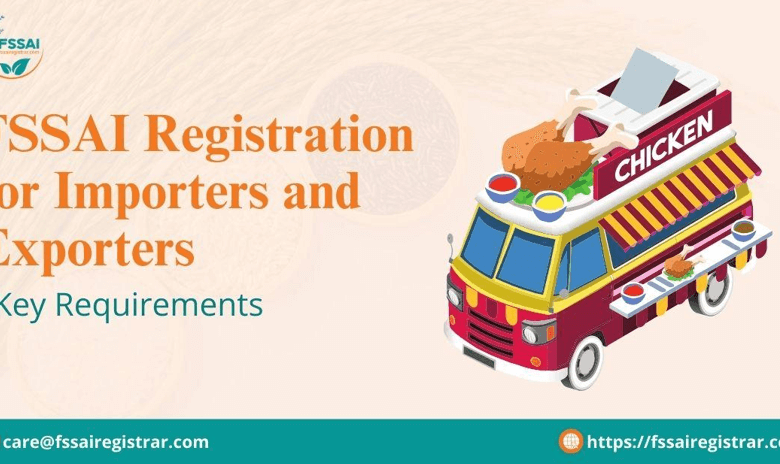FSSAI Registration for Importers and Exporters: Key Requirements

The Food Safety and Standards Authority of India (FSSAI) is the governing body responsible for regulating and supervising food safety in India. For importers and exporters dealing with food products, obtaining FSSAI Registration is a crucial step to ensure compliance with the country’s food safety standards. Here are the key requirements for FSSAI registration for importers and exporters:
Understanding FSSAI Registration
FSSAI registration is a mandatory requirement for businesses involved in the import and export of food products in India. This registration ensures that the food products meet the prescribed safety standards and are safe for consumption. The FSSAI issues different types of licenses based on the scale and nature of the food business:
- Basic Registration: For small-scale food businesses with an annual turnover of up to ₹12 lakhs.
- State License: For medium-scale businesses with an annual turnover between ₹12 lakhs and ₹20 crores.
- Central License: For large-scale businesses with an annual turnover exceeding ₹20 crores and for businesses involved in the import and export of food products.
Key Requirements for FSSAI Registration
1. Eligibility
- Importers: Any individual or business importing food products into India must obtain an FSSAI Central License.
- Exporters: Businesses exporting food products from India also require an FSSAI Central License.
2. Documentation
To apply for FSSAI registration, the following documents are required:
- Form B: Completed and signed by the proprietor, partner, or authorized signatory.
- Proof of Address: Utility bills, rent agreement, or any other valid proof.
- Proof of Identity: Aadhar card, passport, voter ID, or any other valid proof.
- Import Export Code (IEC): Issued by the Directorate General of Foreign Trade (DGFT).
- List of Food Products: Detailed list of food products intended for import or export.
- NOC from the Manufacturer: If the applicant is not the manufacturer.
- Food Safety Management System (FSMS) Plan: Detailed plan outlining the safety measures and procedures.
- Bank Account Information: Copy of the latest bank statement.
3. Application Process
The application process involves the following steps:
- Online Application: Apply through the FSSAI online portal (Food Licensing and Registration System – FLRS).
- Document Submission: Upload the required documents.
- Fee Payment: Pay the applicable registration fee based on the license type.
- Inspection: The FSSAI may inspect the premises.
- Approval: Upon satisfactory inspection and verification, the FSSAI issues the registration/license.
4. Compliance and Renewal
- Compliance: Importers and exporters must adhere to the food safety standards and guidelines prescribed by the FSSAI.
- Renewal: FSSAI registration is valid for 1 to 5 years and must be renewed before expiry. Renewal involves applying along with the necessary documents and fees.
Benefits of FSSAI Registration for Importers and Exporters
Obtaining FSSAI registration offers several benefits to importers and exporters, ensuring smoother business operations and enhancing credibility in the market.
1. Legal Benefits
Compliance with Regulations: FSSAI registration ensures that your business complies with the legal standards and regulations set by the Indian government.
Avoid Penalties: Registered businesses are less likely to face legal penalties and fines for non-compliance with food safety standards.
2. Market Access
Export Opportunities: With FSSAI registration, exporters can access international markets more easily, as many countries recognize and trust the FSSAI standards.
Import Clearance: Registered importers can expedite the customs clearance process, reducing delays and potential rejections of shipments.
3. Consumer Trust
Brand Credibility: FSSAI registration enhances the credibility of your brand, as consumers are more likely to trust products that comply with recognized safety standards.
Product Safety Assurance: It assures consumers that the food products they purchase are safe and of high quality, leading to increased customer satisfaction and loyalty.
4. Business Growth
Market Expansion: Compliance with FSSAI standards can help businesses expand their market reach both domestically and internationally.
Competitive Advantage: Being FSSAI registered provides a competitive edge over non-registered competitors, as it signifies adherence to stringent food safety practices.
Read also: Vehicle Rental Dubai: No Visa Required
Challenges and Solutions
While the FSSAI registration process is straightforward, importers and exporters may face certain challenges. Here are some common challenges and their solutions:
1. Documentation Issues
Challenge: Incomplete or incorrect documentation can delay the registration process.
Solution: Ensure all required documents are correctly filled out, signed, and uploaded. Seeking professional assistance can help in accurately completing the paperwork.
2. Regulatory Compliance
Challenge: Keeping up with the ever-evolving food safety regulations can be daunting.
Solution: Regularly update yourself with the latest FSSAI guidelines and standards. Subscribing to FSSAI notifications and consulting with regulatory experts can help stay compliant.
3. Inspection Delays
Challenge: Delays in the inspection process can slow down the registration approval.
Solution: Prepare your premises thoroughly for inspection by adhering to the FSMS plan and ensuring all safety protocols are in place. Promptly address any issues raised during the inspection.
4. Renewal Management
Challenge: Forgetting to renew the FSSAI registration on time can lead to penalties and business disruption.
Solution: Set reminders for renewal dates and start the fssai license renewal process well in advance. Keep all necessary documents updated to facilitate a smooth renewal process.
Conclusion
FSSAI registration is an essential requirement for importers and exporters dealing with food products in India. It ensures that the food products meet the safety standards and are fit for consumption. By understanding the key requirements and following the prescribed procedures, businesses can ensure smooth operations and compliance with the regulatory framework.





